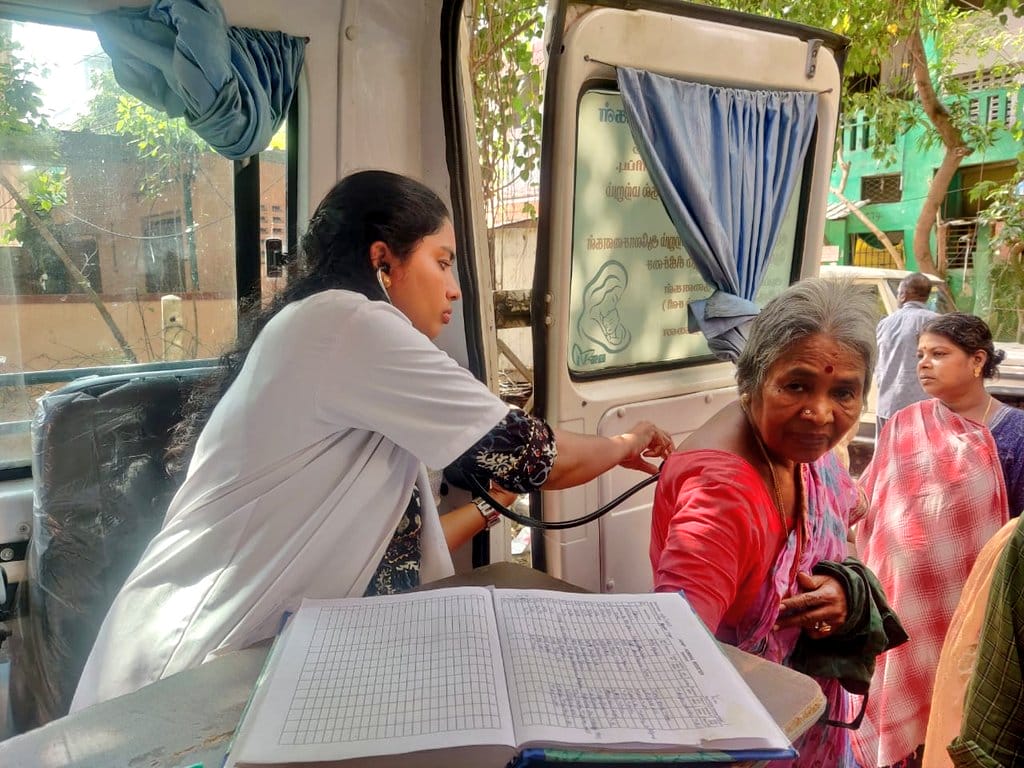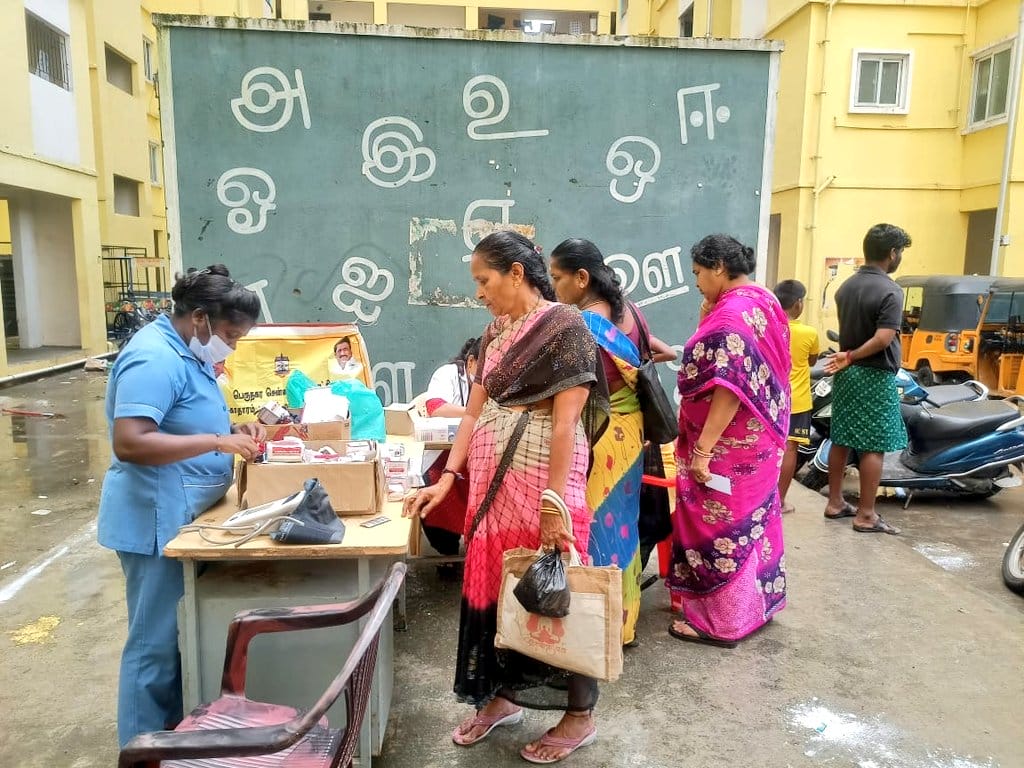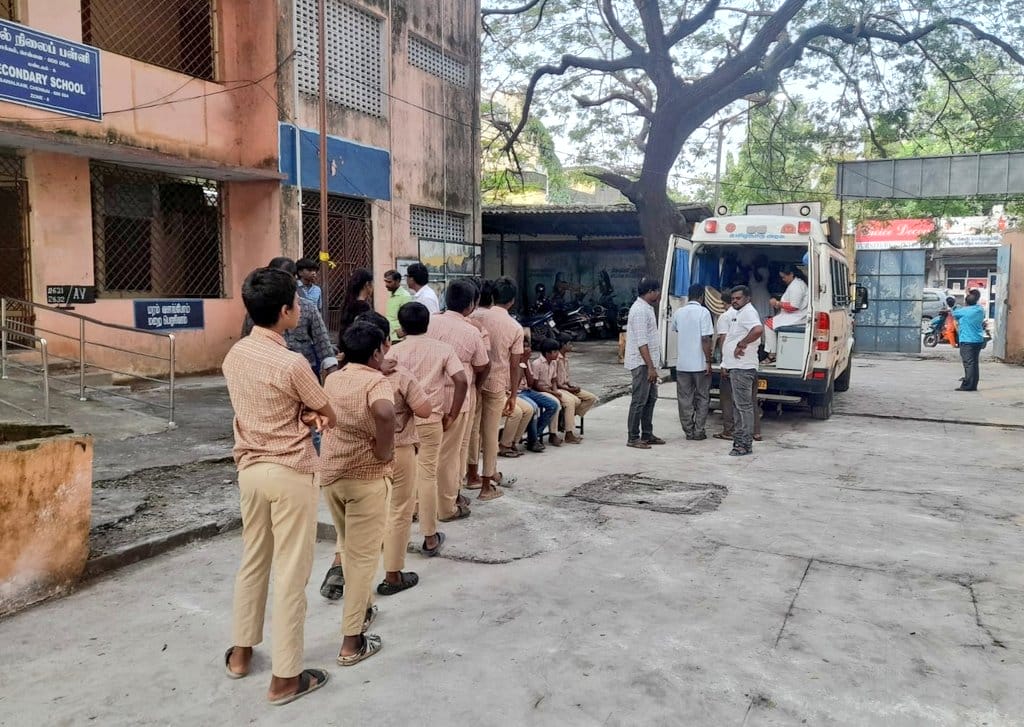Jayakumari* from Velachery recalls the horrific moments of December 5th, when floodwaters filled the streets adjacent to her house and the long power cut that ensued worsened her unhealed wounds from mosquito bites. A chronic diabetic, she has been advised by her doctor to stay indoors to prevent accidents and avoid aggravating her health condition. She dreads the rain, as the stagnant water brings in the mosquitoes. “I use a crutch to walk and because the electricity was out for 72 hours, I was just using my sari to fan my injured leg to ease the pain. The size of my wounds from mosquito bites keep widening during the rains,” she says.
A few kilometres away in Thoraipakkam, Anjitha Pravin, a working woman, is distraught by the havoc the storm created at her rented apartment. She had left for her hometown in Kerala before Cyclone Michaung hit Chennai. Upon her return on December 8th, she discovered an irreparable kitchen and a lost scooter. Some parts of her home were severely damaged, with the walls mouldy and in need of repainting. Anjitha explains how her fears turned into a harsh reality, as she has been suffering bouts of allergy attacks, experiencing skin rashes and sneezing in response to the weather conditions and the mould growth.
“I am house hunting and the process is turning into a health crisis for me; I looked for a few houses in Teynampet and I could see the flood water marks in the parking area with dirty walls and foul smell. I don’t think I can afford a clean space without allergy attacks anytime soon,” she exclaimed.
In the aftermath of Cyclone Michaung in Chennai, many residents grappled with the dual challenges of rain-related infections and unmet medical needs. Many fell sick, while others with chronic ailments had to deal with inaccessibility of medicines as many localities were cut off from the rest of the city because of the floods.
Meanwhile, the primary health centre in T Nagar is seeing a steady inflow of people coming with various health concerns like fever, nausea and loose stools. The medical staff at the centre explains how since the centre is stationary and known to the residents many choose to visit and get medical help.

Infections and challenges
According to the Tamil Nadu government’s Department of Public Health, 16,516 medical camps were held in flood-prone areas and 7,83,443 people were treated in these camps in the last seven weeks. In Chennai and adjacent districts, vaccinations are being given regularly in medical camps and as of December 16, rubella vaccinations have also been extended to children aged between nine months and 15 years. According to the Greater Chennai Corporation (GCC), 3,270 cases of fever and 1,972 cases of cold and fever were treated in the city.
In addition, GCC is providing half a kg of bleaching powder to each family in the four districts affected by Cyclone Michaung, to clean the overhead water tanks and ground water tanks.
There has been a surge in water-borne ailments, vector-borne diseases like dengue, respiratory ailments, cold, fever and allergies, triggered by contaminated water and the unclean environment owing to inundation. “A lot of cases of diarrhoea and vomiting were reported this week in all of the camps I worked. We do give preventive care and aftercare for every patient visiting the camp; in case of any symptoms that need more attention, we refer the patients to government hospitals,” says Hema Rosi, a staff nurse at a T Nagar medical camp. Stationed at the health centre of GCC’s Department of Public Health during the day shifts, Hema awaits calls from camps. When staff are required, camp medical officers call for assistance.
Chinnaponn, an apartment sanitation worker in T Nagar, who lives in the basement talks about her difficulties through the cyclone. When water gushed in, she was alone to clear the debris that came with the water. “I had been suffering from fever since the last week of November. I have skin infections that come and go, I visit the primary health centres whenever I can,” she says. Chinnaponn cleared out the apartment garbage even during the cyclone as rats started feeding on them. She explained how pushing water out of large garbage bins to dispose of waste exhausts her body.
Medical officer Sivam Jayraj details about health concerns of various age groups and the potential risk factors in the coming weeks. “There are medical camps being arranged in schools as there are reported cases of various illnesses, especially stress-induced symptoms among school-going kids. We are also providing necessary vaccinations at these camps in all locations,” he says. Jayraj further explained how minor accidents to major cases need to be taken into serious consideration and in case of infections from metals or contact with sewage or contaminated water, one needs to visit the camp for medical care.”
Read more: Lessons for Chennai from the rainy days of the southwest monsoon

Community concerns and root causes
Dr. Hemalatha, general physician from T Nagar explains how the post-cyclone period is the time of grave concerns and there is need to take preventive measures. Faulty sewage systems, stagnant water, open drainage, strewn garbage and dead animals all come together as potential risk for health hazards. “We are aware of the common symptoms, so we are prepared to handle different ailments and conduct investigations. However, preventive measures and timely treatment are important for quick recovery.”
A medical officer in a camp in Tambaram explains how flooding of a few government hospitals in Chromepet interrupted the delivery of medical services, highlighting the special medical camps are of utmost importance.
In another instance, Tamil Selvi, who resides in Elango street, shared how she had been diligently preparing for any calamity over the past couple of years. “I sought refuge in my distant relative’s place, especially during the rainy season, as I was struggling with breathing issues.” She takes daily medication for thyroid-related concerns and also experiences inflammation and irritability in her body under stress. During the floods, she had to deal with the additional anxiety of not having access to her medicines.
Malli* from Amudham colony in T Nagar had to deal with a similar ordeal. “During the continuous rains since the first week of December, we were not even able to stock up on food, as I had to allocate funds to purchase essential medications from the nearest pharmacy. Living with asthma, I depend on my inhaler for daily relief. Unfortunately, the relentless rains triggered a severe asthma attack, and I had breathing difficulties. Thankfully, I had emergency medicines on hand that helped me survive through the harrowing night.”
Dr T Priya, a physician attending the medical camps, reveals, “We encountered numerous cases of respiratory issues, skin infections, and water-borne illnesses. The incessant rains created a breeding ground for infections, especially among children. We prioritised vaccinations against water-borne diseases like cholera and provided antibiotics for those presenting symptoms of respiratory distress.”
Nurse Anitha Raji, who played a crucial role in offering healthcare support, emphasises, “Access to regular medications was hampered during the floods. Many individuals, especially the elderly faced challenges in managing their health. Our focus extended beyond immediate treatment to providing guidance on post-flood care and hygiene practices.”
Read more: When Chennai monsoons bring more than rain: Navigating seasonal infections
Health resilience and collaborative response
Inside a Primary Health Centre (PHC), the place was bustling with people seeking medical help. Parents anxiously waited with sick children, some with fever, others struggling with respiratory issues. The air was thick with tension and the sound of coughing.
The medical staff was on their feet, attending to patients in every corner. A nurse hurriedly dealt with a child running a high fever, while a doctor discussed a case of wheezing with a colleague. Nearby, an elderly woman received treatment for skin conditions. Amidst the crowded scenes, a nurse efficiently administered flu shots to a line of individuals, while in another section children received vaccinations.
Soundararaj, superintendent of the Directorate of Epidemiology, elaborates on the collaborative efforts undertaken to bolster the medical response in the aftermath of the cyclone. Recognising the magnitude of the health crisis, volunteers and medical teams from other districts are strategically sourced to reinforce the existing infrastructure to ensure that the medical teams can effectively manage the increased load of patients and address the specific challenges posed by the cyclone. Moreover, essential medical equipment from other districts is mobilised to supplement the resources available at the medical camps.

Call for specialised support
The medical teams at the special rain medical camps focus on providing medicines for common ailments intensified by the climatic conditions, such as cold, fever, and conjunctivitis. However, the need extends beyond these usual cases. Individuals suffering from chronic illnesses, like respiratory issues, cardiac ailments or diabetes, find support in these camps. Lakshmi, the data controller at the Directorate of Medical and Rural Health Services (DMS), emphasises the importance of analysing data from preceding years to identify trends. Based on this information, need-based camps are strategically installed in different zones to address specific medical aid requirements arising from the cyclone aftermath.
Here are some guidelines to safeguard your health during the post-cyclone clean-up:
- Wear protective gear such as gloves, boots, and masks while cleaning to prevent direct contact with contaminated water and debris.
- Dispose of damaged items properly, segregating waste to ensure safe disposal.
- Boil water before consumption to eliminate potential contaminants.
- Use water purification tablets or filters if boiling is not feasible.
- Regularly clean and disinfect water storage containers.
- Discard perishable food items exposed to floodwaters.
- Thoroughly clean and disinfect kitchen surfaces, utensils and cookware.
- Consume only well-cooked food to minimise the risk of food-related illnesses.
- Wash hands thoroughly with soap and clean water after any contact with floodwaters or contaminated surfaces.
- Keep cuts and wounds covered to prevent infections and seek medical care in the nearest camp/ health facility
- Use masks to shield against inhaling dust or mould during clean-up activities.
- Adequate ventilation is crucial when using cleaning agents to prevent respiratory issues.
- Seek support if feeling overwhelmed by the challenges post-cyclone.
- Engage in stress-relieving activities and maintain social connections
- Ensure children have access to clean water and hygienic living conditions.
- Monitor their health closely, seeking medical attention for any signs of illness.
- Stay updated on vaccinations.
*Few names are changed on request